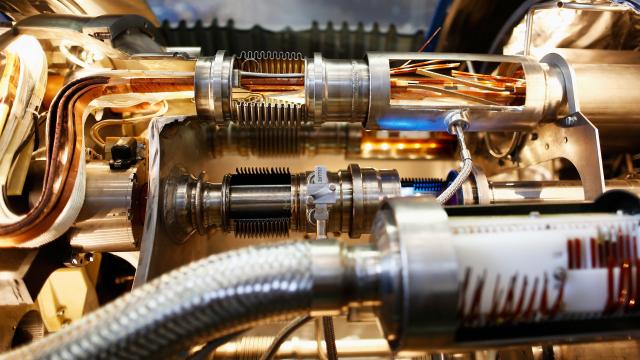Scientists explore the limits of physics by pumping energy into components of atoms, such as electrons and protons, accelerating them to nearly the speed of light, and slamming the beams of particles together in hopes of discovering something new. You can imagine that this process gets quite noisy.
But you don’t hear particles colliding. In fact, the main sounds of particle accelerators come from all of the machinery: engines designed to keep components at cryogenic temperatures, fans whirring in supercomputing sensors, and water rushing through pipes to keep electronics cool. But one of the most notable sounds is the undesirable “whoosh” of superconducting magnets quenching.
“When the quenches happen during the operation of the accelerator, those are almost always unwanted and come at times when we don’t expect them,” David Harding, assistant head of the Applied Physics and Superconducting Technology Division at Fermilab in Illinois, told Gizmodo. “During the most extreme events, we can hear the aftereffects of the quench above the ground… In that case, what you hear is a rushing of air.”
Particle accelerators require many different components to create, accelerate, and collide beams of particles. Powerful superconducting magnets keep the beams in place, aligning and focusing them. These magnets are made from superconducting wire, meaning wire that can transport electricity without resistance. The much higher electrical current through these wires produces stronger magnetic fields. Accelerator operators must keep these superconductors at incredibly cold temperatures, which requires immersing them in liquid helium.
But occasionally, these magnets might quench, meaning the wire that produced the magnetic field suddenly loses its superconducting properties. The quick increase in resistance causes that segment of the wire to heat up. At Fermilab, Harding explained, sensors notice the quick change to the current and signal for the system to heat up the entire wire, since evenly distributed energy will reduce the risk of damage. The helium begins to boil off and its volume increases tremendously, causing a buildup in pressure. The helium gas begins rushing through pipes toward storage tanks, or, if the pressure gets too high, it’s released through valves and emits a screeching sound like a steam locomotive leaving the station.
ALERT! ALERT! Unidentified body block: {“id”:”620988114″,”thumbnail”:{“id”:”b6owtk4lvbi3bboui6ri”,”format”:”jpg”},”type”:”SoundCloud”}
Quenches do happen—most notably, the Large Hadron Collider in Geneva, Switzerland experienced a much-publicized quench in 2008, when six tons of liquid helium vented into the LHC tunnel and damaged 53 magnets. They also occur in more mundane uses of superconducting magnets—the magnets in MRI machines can quench, too.
The quench might be the most notable sound, but Harding explained that there plenty of other noises that a particle physicist becomes familiar with. The predominant background noise at the Tevatron in Illinois was a tremendous amount of water flowing through a loop of pipes in order to keep other electrical and magnetic components cool. “It’s like putting your ear next to a water pipe when someone upstairs is running a shower,” he said. In some areas around accelerator complexes, all of the racket from the machinery means scientists must raise their voices in order to hear each other. There are the mechanical clinks of moving magnets, vibrating compressors to move liquid helium, and beeps from computers in the control rooms. One sound artist, Bill Fontana, visited CERN in 2013 to compose a piece based on sounds made by the source of the collider’s protons.
So, no, you can’t hear subatomic particles colliding inside of the experiment. But the world’s largest science experiments certainly make a lot of mechanical commotion.
